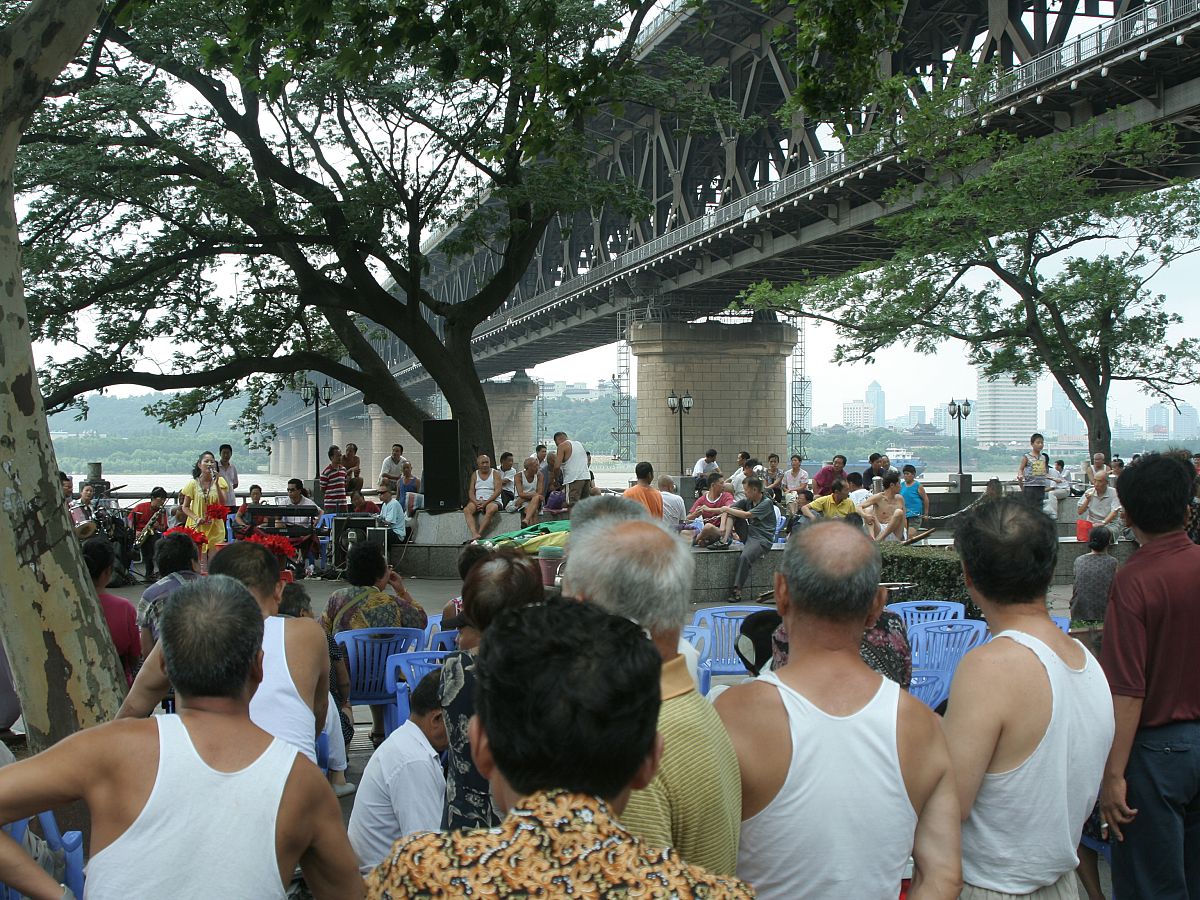Why does music matter to people? We speak to Dr Samuel Horlor, a Teaching Fellow in Ethnomusicology in our Music Department, to learn more about how ethnomusicology can help us understand people’s experiences of music, or ‘musical life’.
Dr Horlor talks us through his research on audiency, street music, and music's embeddedness in everyday urban life in Chinese-speaking contexts.

Taken 30 July 2008 in Wuhan (China). A form of street singing show known as 'Passion Square' taking place beside the Wuhan Great Yangtze River Bridge.
Q: Tell us about your most recent research.
A: I’ve been very interested lately in the different ways audiences are important in musical life in Chinese-speaking contexts. Everything from the ‘conversations’ musicians and crowds share between songs in a rock concert, to how and why spectators gather around a street musician, to people in everyday life responding to the music playing when they walk into a shop.
Q: You describe yourself as an ethnomusicologist. What does this mean in the context of your research?
A: As a field of study, I think of ethnomusicology as grounded in ethnography – that means researching by going to the places where musical life happens, spending significant time with and getting to know people there, and sharing in the experience of what their musical activity means to them.
An absolute must is to be able to speak with people on their own terms, so I’ve worked hard over the years on my Chinese (Mandarin) skills. It’s really at the heart of understanding what’s going on and how the people I work with think of their musical life.
Q: What have you found most interesting in your work with music audiences in China?
A: There is a fascinating blurring of boundaries between the concepts of ‘performer’ and ‘audience’ in Chinese music history. Elite members of ancient societies played instruments not for anybody to listen to, but for their own self-cultivation. And groups of people have always played music together in places like teahouses to amuse each other, with everyone both a performer and an audience member at the same time.
Some people think that the rise of the more familiar modern concert has replaced all this, and that the job of the audience has become just to listen passively. But my work shows so many ways in which people contribute actively to musical events, whether or not those people have a role in making the sounds.
Think of a group of people gathered around a karaoke stand on a street corner in a Chinese city. You can go from walking past, to joining the audience huddle, to paying a small fee to sing the next song – all with no perceptible boundaries between different roles. Things are very fluid and dynamic.
Q: And what about the music played by the people you work with?
A: There are lots of interesting issues to study in relation to the musical sounds, especially the sounds of everyday life in contemporary China. The Chinese-language popular songs commonly heard sometimes feature things like traditional instruments that act as national symbols – erhu fiddles, zheng zithers, and others.
Plus, in a place with lots of variety in dialects spoken, language is a particularly meaningful aspect of musical life here. At a street performance in the city of Wuhan, for example, people may switch from singing a Cantonese song from Hong Kong, then addressing the audience in Mandarin as the national language of mainland China, then chatting with individual audience members behind the scenes in local Wuhan dialect.
Q: Why is this research important?
A: One of the most fascinating parts of studying and researching different kinds of music, and the great variety of contexts for musical activity around the world, is challenging our assumptions about what music is and why it matters to people. It becomes clear that it’s much more than just musical notes on a page; to go deeper means becoming an anthropologist, a historian, psychologist, geographer, political scientist, and many other things.
It’s ultimately about learning to look critically at how things have come to be the way they are, and to see and hear the world from different perspectives. From this point of view, studying music can be a window onto almost any contemporary issue imaginable. I’m constantly inspired by the rich opportunity music has given me to engage more and more deeply with Chinese language and culture.
Find out more
- Dr Samuel Horlor is a Teaching Fellow in Ethnomusicology in our Department of Music,
- Want to learn more about Samuel's research? Check out his ResearchGate profile.
